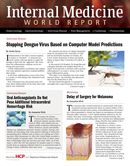Antibiotics Safe for Infants with Severe Bacterial Infections
Infants can be effectively treated as outpatients using antibiotic regimens in the case of parents refusing hospital referral, according to a trio of studies published in The Lancet and The Lancet Global Health.

A trio of studies published in The Lancet and The Lancet Global Health indicate that simple antibiotic regimens are safe for newborns and infants with severe bacterial infections, such as pneumonia or sepsis, who may not have access to hospital care.
The authors of the Global Health study noted that a severe infection is one of the leading causes of worldwide neonatal deaths. Each of the studies were funded entirely or in part by a Bill & Melinda Gates Foundation grant.
In the first Lancet study, researchers observed about 3,500 infants (aged 0-6 days and 7-59 days) with clinical signs of severe infection whose parents did not accept hospital referral. The infants were randomly assigned to one of 4 groups for treatment regimens: group A (injectable procaine benzylpenicillin- genatmicin for 7 days), group B (injectable gentamicin and oral amoxicillin for 7 days), group C (injectable procaine benzylpenicillin- gentamicin for 2 days then oral amoxicillin for 5 days), or group D (injectable gentamicin for 2 days and oral amoxicillin for 7 days).
Groups A and C demonstrated the highest rate of treatment failure at 8%, while group B showed 6% and group D showed 5%. About 1% of infants died in groups A, B, and D, while 2% died in group C. The investigators believe these 3 simplified regimens were as effective as outpatient treatment with injectable procaine benzylpenicillin- gentamicin for 7 days in the infant patient population.
Researchers recruited 2,300 infants aged 0-59 days with fast breathing as the only sign of possible serious bacterial infection across 5 sites in Africa for the second Lancet study. The infants’ parents had again refused hospital referral. The infants either received injectable procaine benzylpenicillin- gentamicin once per day or twice daily oral amoxicillin treatment for 7 days. The procaine benzylpenicillin- gentamicin treatment group included 234 infants (22%) who failed treatment, compared to 221 infants (19%) in the oral amoxicillin treatment group who failed treatment. By follow up day 15, 4 infants from each group died, but no drug related serious adverse events were detected. The researchers wrote that infants with fast breathing alone could be effectively treated using oral amoxicillin in the case of parent refusal of hospital referral.
For the Global Health study, researchers studied infants in Bangladesh in order to determine whether 2 alternative antibiotic regimens with reduced numbers of injectable antibiotics combined with oral antibiotics had similar safety and efficacy to the standard regimen. Nearly 2,500 infants were recruited and assigned to either group A (standard treatment with intramuscular procaine benzylpenicillin and gentamicin once per day for 7 days), group B (intramuscular gentamicin once per day and oral amoxicillin twice per day for 7 days), or group C (intramuscular procaine benzylpenicillin and gentamicin once per day for 2 days followed by oral amoxicillin twice per day for 5 days).
After a week, 10% of the group A infants had treatment failure, compared to 8% of the group B and 8% of the group C infants. Infant death before day 15 and non-fatal relapse rates were similar in all 3 groups. The researchers concluded the 2 alternative outpatient antibiotic regimens were as efficacious as the standard treatment.
